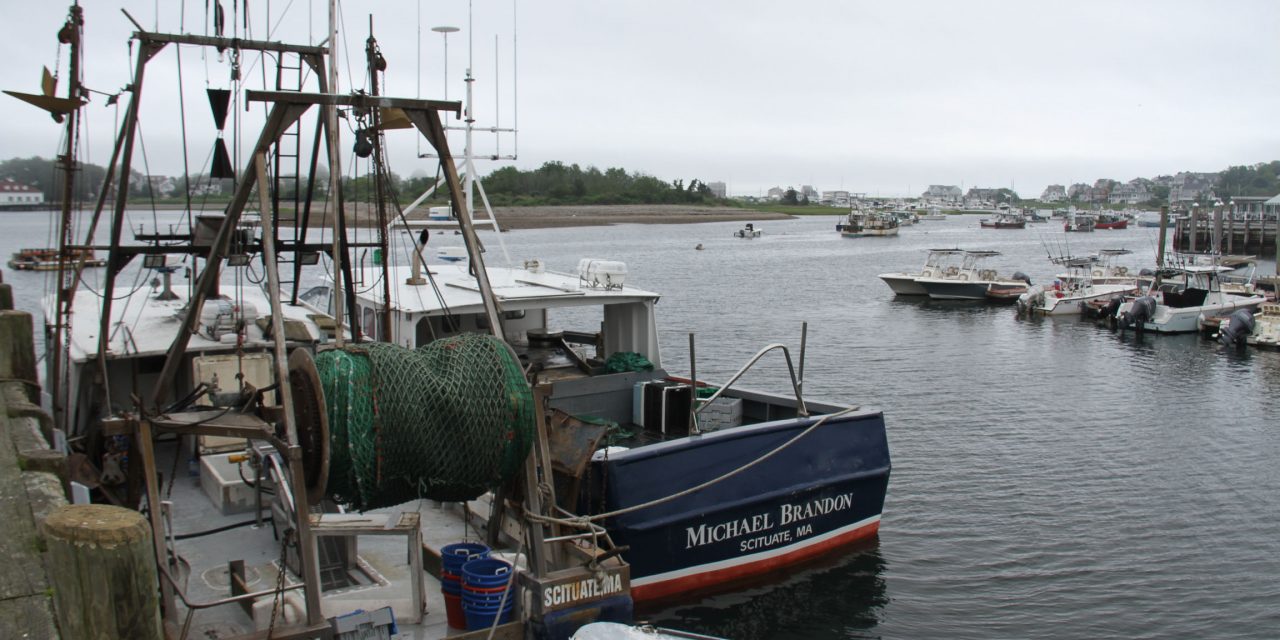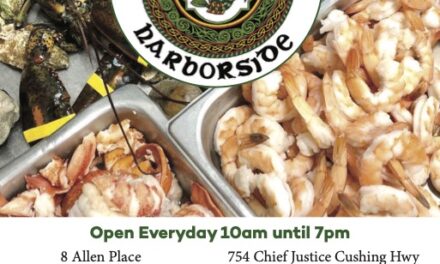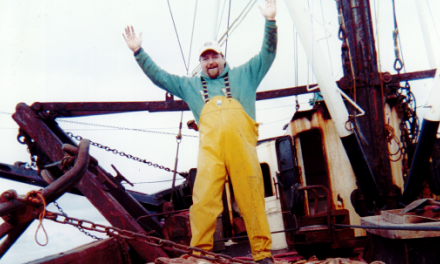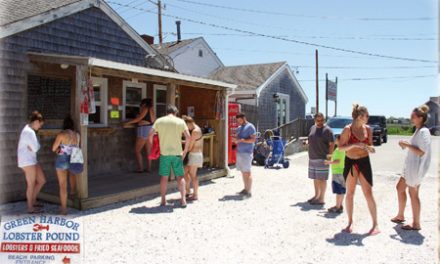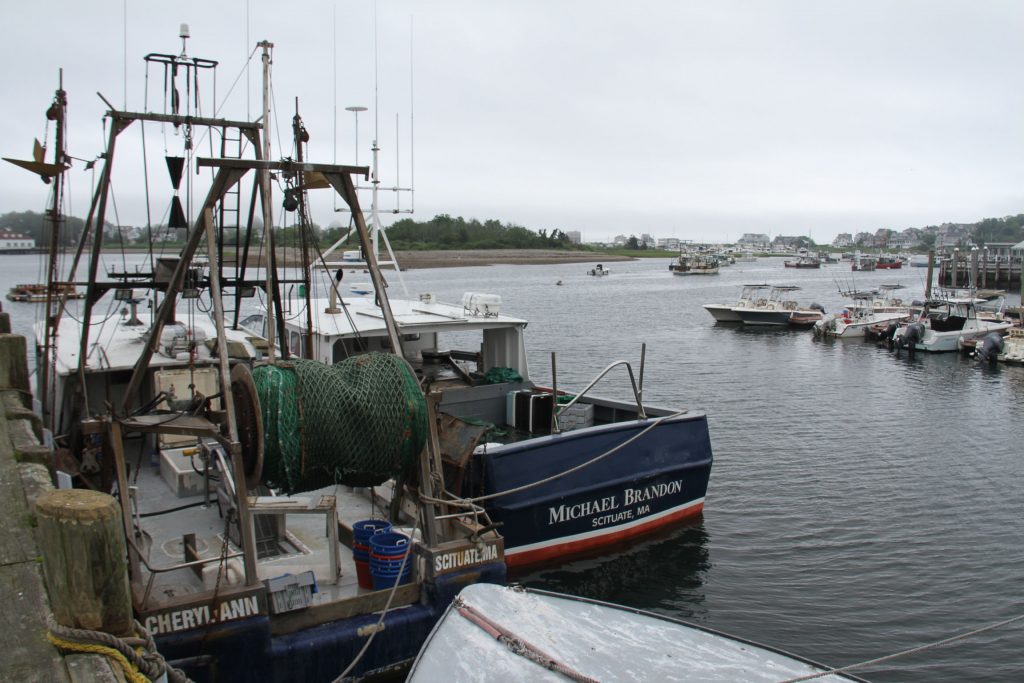
By Pam Denholm.
The cries of gulls hanging in the salty sea air as boats haul in their fishy catch have been part of the Scituate Harbor landscape for hundreds of years. In the 1700s, the boats were schooners and the catch was mackerel, which was loaded into barrels of briny water to be shipped to the plantations in Southern and West India where it was traded for sugar, molasses, and tapioca. The mackerel was also sent south; Carolina and Georgia plantations returned rice, wheat flour, tobacco, and indigo in trade. Mackerel was an inexpensive protein to feed slaves. There were an estimated 35 vessels out of Scituate Harbor at that time, carrying anywhere from 50 to 150 tons and averaging six to fifteen deckhands. Scituate was a fishing town and if you were not a fisherman, you were probably involved in any number of shoreline businesses—even building fishing vessels in the North River or manufacturing barrels, perhaps.
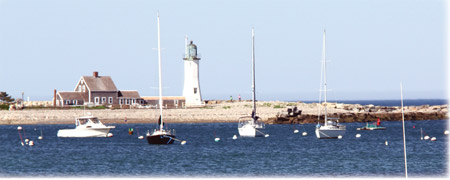
Industry Challenges
The industry has faced many challenges in the years since. British blockades during the American Revolution and the War of 1812, the Civil War, and diminishing mackerel runs—all have forced fishermen and supporting industries to adapt and change to survive.
Today, in place of the schooners we have boats powered by diesel, the crews are much smaller, and the catch is varied and seasonal. As recently as four decades ago, dozens of commercial fishing boats still jostled for a spot on the dock, supported by a shoreline of processing plants, ice manufacturers, brokers, and markets. Since then, evolving regulations and new state and federal laws have made it almost impossible for new generations of fishermen to take the helm. Ten years ago, the number of commercial fishing vessels in Scituate Harbor had fallen to maybe a dozen.
Today there are just six, and although 10-15% of all fish caught out of Scituate Harbor is processed in Scituate at Mullaney’s Fish Market, most of it has to be transported in refrigerated trucks to New Bedford or Boston to be auctioned. The fish is sold at international market prices, and fees for transport, processing, brokering, and auctioning cost our fishermen around 25 cents per pound—and that’s before they have paid for fuel, maintenance, or licenses.
Fish caught in Scituate Harbor is being eaten hundreds of miles away, and most of the fish we enjoy on the South Shore is imported from other countries. This global market approach is not sustainable for our local fishermen. Eventually, we could lose all commercial fishing boats in Scituate Harbor and the town’s rich and colorful heritage will be kept alive only by story-telling old-timers. Once again, it’s time to adapt.
A Local Solution
So how do you revitalize a local industry on the brink of collapse? You dust off that New England pioneering spirit, put on your Captain’s cap, consult your compass, and cast off. Turns out we didn’t have to sail faraway oceans to find the answer. Instead of relying on robust commercial fishing activity to drive shoreline industry, Joby Norton of Mullaney’s Fish Market in Scituate is tackling the problem from the other direction. He is building a new fish processing facility that will dramatically reduce cleaning and market-related expenses, thus driving local fishing activity while simultaneously nurturing our fishing story back to health.
Kevin Norton, a commercial fisherman on the vessel Miss Emily, is very supportive of his cousin’s bold new plan. “Somebody has to do something or it will all be gone,” explains Kevin. “We have suffered through all the stock management issues of the last decade. Right now our oceans are healthy, and our fish stocks are healthy. We are only catching 20% of what is biologically safe to catch, but we just can’t compete on a global market against China or Russia.”
Joby’s new facility is not born purely out of nostalgia and altruism. This is intelligent and forward thinking. A significant amount of time has been spent on engineering, and the state and town permitting process is complete. When it opens this fall, the facility will be a flagship employing green technologies to reduce environmental impact as far as possible. “We will be reusing gray water and installing a green roof with solar panels,” states Joby, “and new refrigeration technology will use the outside temperature the five months of the year when it is under 35 degrees Fahrenheit.” This, in comparison to running refrigeration in a heated building in winter. Joby is also reducing plastic packaging and single-use plastic, opting for compostable corn, soy, or bamboo alternatives, and using glass where appropriate.
It’s not just all this smart technology that makes his plan smart. Instrumental to the success of processing the fish locally is selling it locally. Joby will be ramping up Mullaney’s distribution with the view of pushing global product out of our local market. The strategy involves increasing wholesale distribution to restaurants and retail outlets, as well as finding new customers within our local school systems where Joby hopes our children will enjoy fish tacos or a fish sandwich at least once a week.
Future Fish Tales
“We have some terrific chefs on the South Shore; there is a lot of talent, and people care what’s on their plate,” says Kevin, “and a pound of local fish is cheaper than a pound of hamburger from wherever.” Residents on the South Shore want more clarity when it comes to seafood—the integrity of what we consume is more and more important to us and we want fish that is fresh. Kevin is often asked by passers-by if they can buy fish right off the boat. Unfortunately, that is prohibited by law, but with shoreside processing available this fall, Joby will tackle this next challenge with the launch of a new “boat-to-table” website in the spring of 2020. Fishermen will be able to post pictures of their day’s catch while still out at sea, allowing us to see what’s coming in and buy it online right from the fishermen. It will then be cleaned, filleted, and available for pick up from Mullaney’s the next day.
Joby loves what he does. He has worked at Mullaney’s since 1985, and then had the opportunity to buy it from Chris Mullaney 12 years ago. There is much to be done in the next few months. Joby will be moving his office from Scituate to their Cohasset location for the build, and he will be developing new processes and training staff. The entire project will cost $2 million, a massive investment for a local businessman, but that’s why we are so excited about the “buy local” campaign. When we support these passionate pioneers, we build stronger communities and maintain our cultural identity and our heritage, and everybody wins. This is an exciting new chapter for our local fishermen, one that gives us hope that our children’s children will one day wait dockside under the cry of gulls for a new generation of fishermen to haul in the day’s catch.
Mullaney’s Harborside Fish Markets
(currently closed for renovations)
8 Allen Place
Scituate, MA 02066
(781) 545-5000
754 Chief Justice Cushing Highway
Cohasset, MA 02025
(781) 383-1181
www.MullaneysFish.com
Pam Denholm is a local writer who loves her seafood fresh and simply prepared. The more local the better, from oysters and lobsters to mussels and fish—what’s the point of eating seafood if you can’t actually taste the sea?

